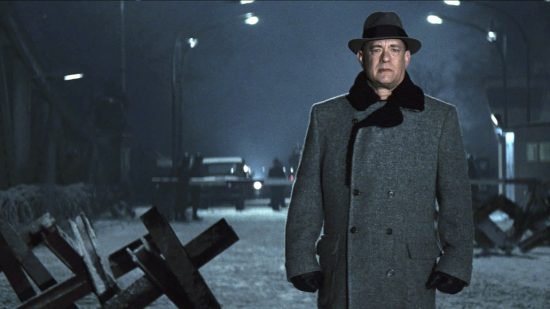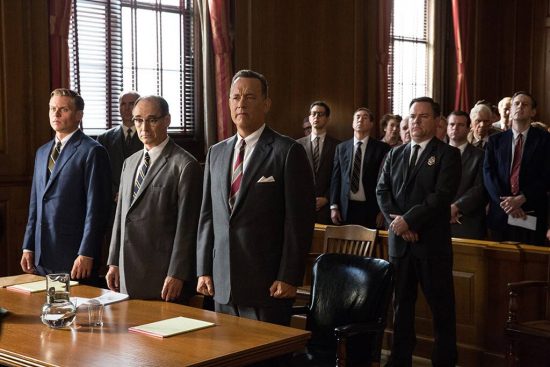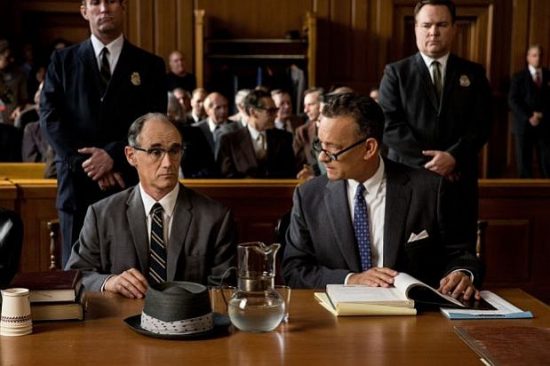SpielBLOG: Bridge of Spies – A Steven Spielberg Retrospective
Steven Spielberg has it appears two ways of approaching films. One is the passion project that takes years of dithering and gestation – Lincoln was certainly in this category – and the other is the script that comes together with the actors very quickly and Spielberg gets it underway as quickly as he can. Catch Me If You Can has that hit-the-ground-running spirit and Bridge of Spies, which was released in 2015 also feels like this.
Starting as a script by novice screenwriter Matt Charman, Ethan and Joel Coen were later called in for a polish, but there are only a few discernible touches. The film tells the true story of James Donovan (Tom Hanks), a lawyer who is given the job of defending Mark Rylance’s Russian spy, Rudolf Abel. We meet Rudolf first, and the film gives us every reason to like him. He is a quiet, methodical man: an artist played with genuine charm by Rylance, an actor who would become a favourite with Spielberg. The G-Men pursuing him are heavy-footed, oafish characters who he manages to outwit, destroying important evidence even after he has been arrested. It’s odd that the film devotes so much admiration to the man. He is bathed in beautiful light, and wins the respect of Donovan, who insists he is an honourable man.
The first half of the film follows his legal plight and continues a trend in Spielberg’s movies of becoming increasingly interested in the process of law. As with Catch Me If You Can, Amistad, Lincoln and later The Post, we find ourselves once more watching the machinations of the legal process, this time following it up to the Supreme Court. It is only with the downing of a U2 spy plane and the capture of Francis Gary Powers that the film transforms into something more ambitious.
Once in Berlin, where now Donovan must negotiate for the release of Powers – as well as a student who has been captured by the East German authorities – the film aspires to a John Le Carré espionage feel and something of a historical sweep as the Berlin Wall is being built. Earlier we’ve been treated to the creeping Cold War paranoia that sees Donovan’s family violently intimidated by those opposed to his defence of a ‘commie’ and his young son go through the school instructions on what to do when the bomb inevitably drops.
But the problem is Spielberg doesn’t really take this that seriously. There’s a smallness to the film that can be seen clearly in some of the departures from historical accuracy. Donovan wasn’t quite the outsider of the government – having served in the OSS during the war, and so linked to the CIA – that the film suggests. Hanks plays his fish out of water role well, but the hands-off approach of the government lacks credibility and he is surrounded by bureaucrats who he easily rises above. He seems more at risk from a cold he catches than any danger from either of the three belligerents. Oddly, he might have caught the cold from Rylance who also sports a consistent sniffle throughout the film.
The Soviets and then the East Germans are mostly played for comedy, and even the maltreatment of Powers and Frederic Pryor (Will Rogers) feels perfunctory. The scene of the wall being built is perhaps the weakest. It looks like something that you might get away with on stage, but looks silly on screen. The shooting witnessed by Donovan is the only blood spilled and is the only scene that brings some weight to what otherwise maintains a light touch.
Throughout the film, Donovan remarks to Rudolf ‘Don’t you worry?’ ‘Would it help?’ comes the reply. Why the screenwriters decide to have this exchange three times is baffling. In a Coen Brothers film that might be a quirky piece of intransigent comic reflex. Here, it just feels sloppy and unnecessary. Also, the generic title could have been replaced by ‘Standing Man’, from an anecdote which Rudolf tells Donovan and represents the core message of the film.
The music is by Thomas Newman, subbing for the ill John Williams. And the cinematography is by the constant collaborator Janusz Kamiński. He keeps his sources of light turned up to full, so that in one nighttime rain shot, you can almost feel the heat from the massive lights. Rooms are lit as if the winter sun is shining in through the windows with all the power of a new God. It might just be distracting to me because I’ve started to notice but I do wonder if Spielberg changed his collaborator on the camera from time to time, there might be other directions he can go in.
There’s nothing wrong with the film. It moves fast enough; the performances are fine and the story is compelling enough. There are also plenty of cute pieces of business that can be relied on. Hanks and Alan Alda get a couple of good scenes together and the comedy is mildly funny. Hanks is a reliable presence but that sums up what is wrong with the film. It is a safe hands, reliable piece of work, which sanitizes the Cold War in its rush to be inoffensive.
Spielberg has produced some uncomfortable works about the 20th Century and he always brings something new to the table but this is a missed opportunity. As if the Cold War just isn’t that interesting for him. He is like Donovan, a talented outsider who can’t quite work out what all the fuss is about and finds the passions that have been provoked unseemly. With no real convictions one way or another, the film closes the deal and insurance man Donovan can return to Brooklyn for a well-earned nap. The Cold War is over anyway and never has a Spielberg period film felt less urgent. Could it be a sign that he is running out of things to say?














